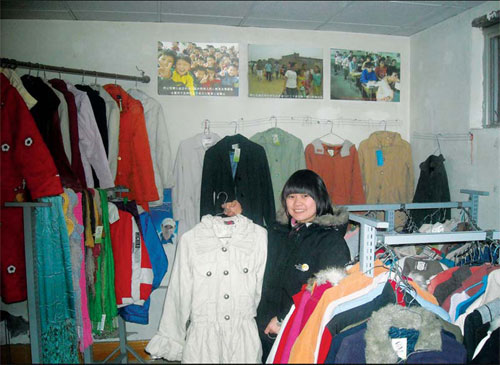More charity chain stores for Beijing
 0 Comment(s)
0 Comment(s) Print
Print E-mail China Daily, August 6, 2012
E-mail China Daily, August 6, 2012
 |
|
Chen Zhiyan, a 22-year-old shop owner, shows an article of clothing in the Tongxinhuhui charity store in Dongyao village, in Chaoyang district of Beijing. [Photo/China Daily] |
The network of charity supermarkets is expected to expand across Beijing, both in urban and suburban districts.
In residential communities with a supermarket, donation sites will have to be established, according to a senior official.
In the charity supermarkets and donation sites, there will be a system for processing articles that are donated by residents, said Cheng Liyan, director of the charity work office of the Beijing Civil Affairs Bureau, earlier last month on Beijing Public Service Radio.
For example, he said, old clothes collected by the donation sites will have to be cleaned, sterilized and ironed before they go on sale in the market. Clothes that cannot be recycled will be processed into other products.
Revenues gained through selling donated products at the charity supermarkets will be returned to the donation sites and used to help impoverished residents living in the community, Cheng said.
Currently, there are about 8,000 charity supermarkets across the country. Most of them are subsidized by local governments, said Wang Zhenyao, dean of One Foundation Philanthropy Research Institute at Beijing Normal University.
They largely rely on government funding and haven't found appropriate commercial strategies yet, Wang said.
However, Beijing-based Tongxinhuhui charity chain stores have managed to turn losses into profits.
The first shop was opened in 2006 by Migrant Workers Home, a nonprofit organization dedicated to serving migrant workers. It has now expanded to 12 stores in Beijing, all of them located in residential communities around the Fifth and Sixth Ring Roads.
"Because most of our customers are migrant workers, we chose to locate the stores closer to them," said Wang Dezhi, one of the founders of the chain.
After losing money for the first two years, the chain began to turn the tables in 2010. Last year, it reported a profit of about 130,000 yuan in its financial report, which is released once a year on its official website.
Wang put down the store's success to a number of reasons, among them its effective management.
Not only does Tongxinhuhui charity chain store collect donations of a variety of articles from residents, but also from universities, enterprises and other nonprofit organizations.
Up to now, it has established ties with about 50 colleges in Beijing and about 100 enterprises, such as Cathay Life Insurance Co's Beijing branch and Datang Telecom Technology & Industry Group.
"Volunteers in colleges help us to collect the donations and we also have set up donation boxes in companies," said Wang Dezhi. "The number of families that frequently contribute to our donation box is 3,000 and the number of our partners is on the increase year-on-year."
Charity chain store staff visit donors' homes to receive articles after being told they have something to give. The items are kept in a warehouse awaiting demand from stores.
"A store requires a delivery once a week when the business is doing quite well," said Wang.
Challenges grow with expansion because it will require more cost for management if more stores are opened. In addition, efforts should be made to improve transparency, said Wang.
"I hope we can release our financial report once a quarter or even once a month," he added.
Wang Zhenyao said that for most of the charity supermarkets sponsored by governments, the problem that needs to be solved immediately is in applying business systems. For Tongxinhuhui, the biggest obstacle in their expansion is that they lack the experience of running large-scale charity chain stores.






Go to Forum >>0 Comment(s)